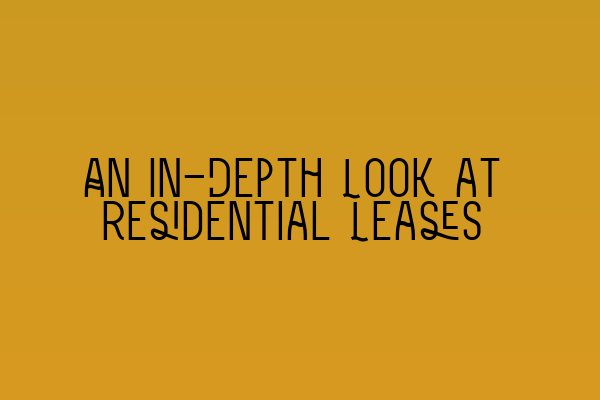An In-Depth Look at Residential Leases
Welcome to SQE Property Law & Land Law! As solicitors specializing in property law, we are here to provide you with an in-depth look at residential leases. Whether you are a landlord or a tenant, understanding the intricacies of residential leases is crucial in order to avoid legal issues and ensure a smooth and harmonious tenancy.
What is a Residential Lease?
A residential lease is a legally binding contract between a landlord and a tenant that outlines the terms and conditions of renting a residential property. It sets out the rights and responsibilities of both parties and provides a legal framework for the tenancy.
Residential leases typically cover important aspects such as the duration of the lease, the amount of rent to be paid, maintenance responsibilities, and any restrictions or conditions imposed on the tenant. This agreement helps to protect the interests of both parties and creates a basis for a long-term relationship.
Key Elements of a Residential Lease
Residential leases are comprehensive documents that cover a wide range of aspects related to the tenancy. Here are some key elements that are typically included:
Duration of the Lease
The lease will specify the duration of the tenancy, including the start and end dates. It may be a fixed-term lease, which means it has a specific end date, or it could be a periodic lease, which continues on a month-to-month basis.
Rent Payment Terms
The lease will outline the rent amount, how and when it should be paid, and any consequences for late payments. It may also specify if there will be any rent increases during the tenancy and how they will be determined.
Security Deposit
A security deposit is a sum of money paid by the tenant to the landlord as a form of protection against any damages or unpaid rent. The lease will detail the amount of the security deposit, how it should be paid, and the conditions under which it will be returned to the tenant at the end of the tenancy.
Maintenance and Repairs
The lease will specify who is responsible for maintenance and repairs of the property. Typically, the landlord is responsible for major repairs, while the tenant is responsible for day-to-day maintenance and minor repairs. The lease will outline the procedures for reporting and addressing any maintenance issues.
Use of the Property
The lease will set out any restrictions or conditions on how the property can be used. This may include limitations on pets, noise levels, or alterations to the property. It is important for both landlords and tenants to understand and abide by these restrictions to avoid potential conflicts.
Termination and Renewal
The lease will detail the procedures for terminating the tenancy, whether by the landlord or the tenant. It will also outline any requirements for renewal or extension of the lease at the end of the term.
Legal Considerations for Residential Leases
Residential leases are subject to various laws and regulations that protect the rights of both landlords and tenants. These include laws regarding fair housing, eviction procedures, security deposit protection, and more. It is important for both parties to familiarize themselves with these legal considerations to ensure compliance and avoid legal disputes.
As licensed solicitors specializing in property law, we are well-versed in these legal considerations and can provide you with expert guidance and advice. Whether you need assistance in drafting or reviewing a residential lease, handling a dispute, or understanding your rights and obligations, we are here to help.
At SQE Property Law & Land Law, we understand that residential leases can be complex and intimidating. Our team of experienced solicitors is dedicated to making the process as smooth and straightforward as possible for our clients. We have a proven track record of success in handling residential lease matters and are committed to protecting the interests of our clients.
Conclusion
In conclusion, understanding the ins and outs of residential leases is crucial for both landlords and tenants. By being aware of the key elements of a lease and the legal considerations involved, you can ensure a successful and harmonious tenancy. If you need expert advice or assistance with any aspect of residential leases, don’t hesitate to reach out to us at SQE Property Law & Land Law. We are here to provide you with the guidance and support you need.
For further reading on related topics, check out our articles:
- Misrepresentation in Contracts: Unveiling Deceptive Practices
- SQE Contract Law: Analyzing Landmark Cases and Influential Judicial Decisions
- Understanding Contractual Capacity: Rights and Limitations
- Interactive SQE Mock Tests for Contract Law: Test Your Knowledge
- Join Our SQE Contract Law Webinars: Expert Insights and Guidance
